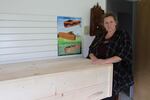A few weeks into the coronavirus quarantine, Jan Stewart's younger sister Tammy Stewart started suffering strange symptoms, like she couldn’t breathe.
She ended up at Kaiser Sunnyside Hospital in Clackamas with COVID-19.
Jan said the family rushed to see Tammy but weren’t allowed inside because of the quarantine.
“We actually made a fuss out of it too because we really … [wanted to see her.] I thought, gosh, I could wear gloves. I could wear the mask," Stewart said.
"She’d just gotten so sick, so quickly and then all of a sudden she was gone.”
Tammy died without any family members by her side.
Jan understands the need for strict hospital regulations, but said it was still very hard not to be with her at the end, even through a window.
But they did talk on the phone.
“We used to sing this certain song when we’d go to sleep ... when we were kids," Jan said. "I listened to her trying to sing the song. And she wasn’t able to ... so I was just humming it to her and then she fell asleep.”
That was the last time the sisters talked.
Jan said Tammy wasn’t a social person and didn’t want a big funeral, so restrictions around large gatherings weren’t a big deal for them.
But for other families, the restrictions are devastating.
They can’t have a big service whether it be in a church, synagogue or mosque.
No more than 10 people can attend a burial. Families stand on the roadside, away from the grave, as others go through the motions.
"This is a horrible time to die," said Elizabeth Fournier, who owns Cornerstone Funerals in Boring.
Fournier said social distancing requirements have made it clear, grieving and physical contact are closely connected.
“That’s why we hug, why we put our hand on someone’s back. That’s why we stand near people to let them know, I’ve got you, I’m with you, you’re going to be OK," said Fournier.
"People really can’t come and bring casseroles and whisk you out to the movie theater, and do all these things for you.”

Elizabeth Fournier, the owner of Cornerstone Funeral Services in Boring, said the quarantine has made it clear grieving and physical contact are closely connected, "That’s why we hug, why we put our hand on someone’s back. That’s why we stand near people to let them know, I’ve got you, I’m with you, you’re going to be okay.”
Kristian Foden-Vencil / OPB
Fournier said funeral directors have come up with new ways to help people grieve.
“We will load up the loved one in a vehicle, and we will actually bring them to someone’s driveway, or bring them to a nursing home and allow those who can’t get out of the house, to see them,” she said.
Families have also developed new rituals to make up for the loss of large gatherings, like lighting a candle at a designated time, or singing a song, or going outside to shout the name of the deceased.
“I have one little lady whose husband died and she says she Zoomed with her sister who’s also a widow and they have their meal together every night and they sit at the table and they Zoom and they think that they can just eat dinner together," said Fournier.
"How beautiful is that? I mean that’s wonderful bereavement therapy right there.”
But mental health experts believe it’s not just people who’ve lost a loved one who are grieving now. We’re all dealing with loss and immense stress with everything happening in the world, ranging from the pandemic to nationwide street demonstrations over police brutality and racist violence.
Related: Coping With Loss And Grief During A Global Pandemic
"Everybody's health has been impacted ... physical health, mental health, emotional health, financial health, spiritual health," said Georgena Eggleston, a grief therapist in southwest Portland.
She said as a society, Americans don’t deal well with loss, whether it’s a loved one or a way of life.
“In our culture we either pull ourselves up by the bootstraps, or we push ourselves to set and get goals. And now we’re being asked to pause," said Eggleston.
"This is a gigantic reset.”
That’s true, believes art teacher Margaret Hespen in Oregon City. She doesn’t think people realize yet what they've lost.
“We’ll start noticing the things we’ve lost when we are maybe afraid to shake someone’s hand. Or can’t see someone smile behind a mask. Or are afraid of each other," said Hespen.
But she has an ace up her sleeve, “Well I think there’s a big plan, that’s bigger than we are," she said.
"That gives me comfort. And so I’m not too worried.”
For those without faith or some other coping mechanism, mental health experts suggest calling a helpline when feeling down — just to check whether it's just life or they need professional help.
